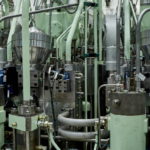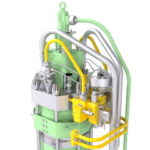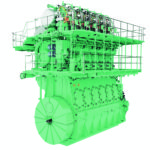Danish-engine manufacture MAN Energy Solutions is preparing for the future with the launch of its latest engine that will be able to operate on LPG, writes Samantha Fisk
Time is running out for the maritime industry with the sulphur cap regulation just around the corner that will take[ds_preview] effect on 1st January 2020. Options of different technologies that will help shipowners meet with the latest emissions regulation are wide and varied and are leaving some in more confusion than clarity.
MAN has brought to the market its latest in engine development of its LPG engine, believing that this will be a market for growth in the future. Pontus Berg, Senior Vice President – Technical & Operations, BW LPG noted that: »LPG is for the future and is the future fuel. The key thing today is that we now have the technology available.«
The development of the MEE-LGIP engine will allow shipowners to comply with the low sulphur regulations that will come in to effect. Designed for its 2-stroke engine range the latest offering from MAN will meet with current and future SOx regulations, lower total cost of operation, be able to switch between different fuels and can be installed on newbuilds or retrofits.
MAN received its first order for the ME-LGIP duel fuel engine earlier this year, which was placed by Exmar Ship Management for 2 + 8 orders of the 6G60ME-LGIP engine for its new very large gas carriers (VLGC’s) that are to be constructed at Hanjin Subic Shipyard, Philippines.
Although these vessels will operate on LNG, MAN notes that this order signals that the industry is starting to move more steadily towards gas as a fuel and having the options of other gas products such as LPG, will allow more flexibility in the market.
»With LNG, LPG and methanol now coming in to play, we have lots of multi fuel opportunities that we can give,« highlights Wayne Jones, chief sales officer, MAN Energy Solutions. Jones also adds about the long-standing issue around infrastructure for future fuels and where the dual fuel engine will be able to help this transition, saying that: »Infrastructure is a big question. We can offer dual-fuel engines that allow the infrastructure to catch up.« He also notes that by offering duel fuel, shipowners will be able to switch to the more favoured the gas or fuel in the future.
MAN has conducted testing on the engine. In the development for operation of LPG MAN studied various technologies and opted for ME-LGI injection concept, which utilises the diesel combustion principle that can also be applied to other fuels that also have a low flash point such as methanol.
Phase one of testing looked at the operation of the engine, such as starting and stopping of the engine and also the supply of LPG. The second part of the testing looked at the engine performance operating on LPG. MAN notes that one key aspect is the stability of the fuel and the switch between two different types. Tests showed that the LPG combustion behaves in a similar way to diesel combustion in a slow speed 2-stroke engine. Flexibility of the latest MAN ME-LGIP engine will also mean that other fuels such as methanol will be a viable option for shipowners in the future. The first ocean going vessel that will operate on methanol, »Lindanger«, has been delivered. Constructed at Hyundai Mipo Dockyard the vessel is for Norwegian shipowner Westfal-Larsen and is the first of two 50,000 dwt tankers for the company.
Concluding, MAN Energy Solutions says that it expects to see more gas carriers coming onto the market in the future. A further advantage of these new carriers is that they will also be able to utilise the cargo onboard as fuel should the need arise.
Samantha Fisk





















